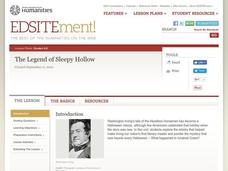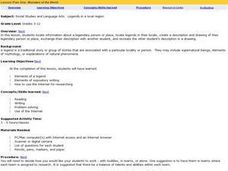Curated OER
The Legend of Sleepy Hollow
Explore Washington Irving's "The Legend of Sleepy Hollow" in this literature analysis instructional activity. Middle schoolers read and summarize the plot of the story. They then adapt passages for a contemporary audience and analyze the...
Curated OER
Headless Horseman, Heady Author
Twelfth graders explore figurative language as it appears in Washington Irving's original text, The Legend of Sleepy Hollow, answer questions based on story, and write sequels to it by using the different types of figurative language...
Curated OER
Conflicts Among People
Students explore the topic of conflict. In this literature lesson, students read and discuss the central issues in "The Legend of Sleepy Hollow," "The Flesh and the Spirit," and "Somnambulism." Students write an essay.
Curated OER
The Legend of Sleepy Hollow
Students research the American Revolution through the story of the Legend of Sleepy Hollow. In this American Revolution lesson, students research folktale and The Legend of Sleepy Hollow. Students view illustrations for the story....
Curated OER
Legends in a local region
Students locate information about a legendary person or place, locate legends in their locale, create a description and drawing of their legendary person or place, exchange their description with another student, and recreate the other...
Curated OER
Comparison and Contrast - D. H. Lawrence
Read The Horse Dealer's Daughter and The Rocking Horse Winner by D. H. Lawrence, then write an essay comparing and contrasting the two stories. Learners choose some aspect to write about, such as themes, characters, setting, or plot.
Curated OER
Six Trait Writing with Jonathan Swift and Washington Irving
Fourth graders demonstrate and evaluate the six traits of writing. They read and identify good writing and bad writing, utilize a rubric to self-evaluate their own writing, participate in a Reader's Theater, and publish a class book.








